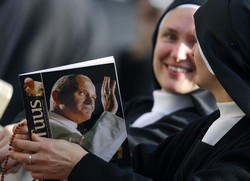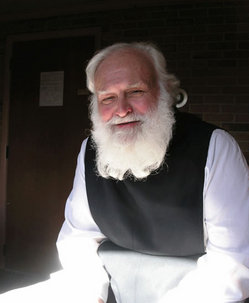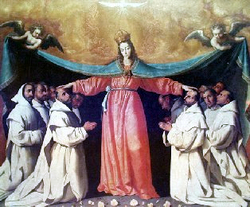 Address of the Holy Father Benedict XVI
Address of the Holy Father Benedict XVI
To the Participants in the
Plenary Assembly of the Congregation
For Institutes of Consecrated Life
And Societies of Apostolic Life
Clementine Hall
Thursday, 20 November 2008
Your Eminences,
Venerable Brothers in the Episcopate and in the Priesthood,
Dear Brothers and Sisters,
I meet you with joy on the occasion of the Plenary Assembly of the Congregation for Institutes of Consecrated Life and Societies of Apostolic Life which is celebrating 100 years of life and activity. Indeed, a century has passed since my venerable Predecessor, St Pius X, with his Apostolic Constitution Sapienti Consilio of 29 June 1908, made your Dicastery autonomous as a Congregatio negotiis religiosorum sodalium praeposita, a name that has subsequently been modified several times. To commemorate this event you have planned a Congress on the coming 22 November with the significant title: “A hundred years at the service of the consecrated life”. Thus, I wish this appropriate initiative every success.
Today’s meeting is a particularly favourable opportunity for me to greet and thank all those who work in your Dicastery. I greet in the first place Cardinal Franc Rodé, the Prefect, to whom I am also grateful for expressing your common sentiments. Together with him I greet the Members of the Dicastery, the Secretary, the Undersecretaries and the other Officials who, with different tasks carry out their daily service with competence and wisdom in order to “promote and regulate” the practice of the evangelical counsels in the various forms of consecrated life, as well as the activity of the Societies of Apostolic Life (cf. Apostolic Constitution Pastor bonus, n. 105). Consecrated persons constitute a chosen portion of the People of God: to sustain them and to preserve their fidelity to the divine call, dear brothers and sisters, is your fundamental commitment which you carry out in accordance with thoroughly tested procedures thanks to the experience accumulated in the past 100 years of your activity. This service of the Congregation was even more assiduous in the decades following the Second Vatican Council that witnessed the effort for renewal, in both the lives and legislation of all the Religious and Secular Institutes and of the Societies of Apostolic Life. While I join you, therefore, in thanking God, the giver of every good, for the good fruits produced in these years by your Dicastery, I recall with grateful thoughts all those who in the course of the past century of its activity have spared no energy for the benefit of consecrated men and women.
This year the Plenary Assembly of your Congregation has focused on a topic particularly
 dear to me: monasticism, a forma vitae that has always been inspired by the nascent Church which was brought into being at Pentecost (Acts 2: 42-47; 4: 32-35). From the conclusions of your work that has focused especially on female monastic life useful indications can be drawn to those monks and nuns who “seek God”, carrying out their vocation for the good of the whole Church. Recently too (cf. Address to the world of culture, Paris, 12 September 2008), I desired to highlight the exemplarity of monastic life in history, stressing that its aim is at the same time both simple and essential: quaerere Deum, to seek God and to seek him through Jesus Christ who has revealed him (cf. Jn 1: 18), to seek him by fixing one’s gaze on the invisible realities that are eternal (cf. 2 Cor 4: 18), in the expectation of our Saviour’s appearing in glory (cf. Ti 2: 13).
dear to me: monasticism, a forma vitae that has always been inspired by the nascent Church which was brought into being at Pentecost (Acts 2: 42-47; 4: 32-35). From the conclusions of your work that has focused especially on female monastic life useful indications can be drawn to those monks and nuns who “seek God”, carrying out their vocation for the good of the whole Church. Recently too (cf. Address to the world of culture, Paris, 12 September 2008), I desired to highlight the exemplarity of monastic life in history, stressing that its aim is at the same time both simple and essential: quaerere Deum, to seek God and to seek him through Jesus Christ who has revealed him (cf. Jn 1: 18), to seek him by fixing one’s gaze on the invisible realities that are eternal (cf. 2 Cor 4: 18), in the expectation of our Saviour’s appearing in glory (cf. Ti 2: 13).
Christo omnino nihil praeponere [prefer nothing to Christ] (cf. Rule of Benedict 72, 11; Augustine, Enarr. in Ps 29: 9; Cyprian, Ad Fort 4). These words which the Rule of St Benedict takes from the previous tradition, clearly express the precious treasure of monastic life lived still today in both the Christian West and East. It is a pressing invitation to mould monastic life to the point of making it an evangelical memorial of the Church and, when it is authentically lived, “a reference point for all the baptized” (cf. John Paul II, Orientale lumen, n. 9). By virtue of the absolute primacy reserved for Christ, monasteries are called to be places in which room is made for the celebration of God’s glory, where the mysterious but real divine presence in the world is adored and praised, where one seeks to live the new commandment of love and mutual service, thus preparing for the final “revelation of the sons of God” (Rm 8: 19). When monks live the Gospel radically, when they dedicate themselves to integral contemplative life in profound spousal union with Christ, on whom this Congregation’s Instruction Verbi Sponsa (13 May 1999) extensively reflected, monasticism can constitute for all the forms of religious life and consecrated life a remembrance of what is essential and has primacy in the life of every baptized person: to seek Christ and put nothing before his love.
 The path pointed out by God for this quest and for this love is his Word itself, who in the books of the Sacred Scriptures, offers himself abundantly, for the reflection of men and women. The desire for God and love of his Word are therefore reciprocally nourished and bring forth in monastic life the unsupressable need for the opus Dei, the studium orationis and lectio divina, which is listening to the Word of God, accompanied by the great voices of the tradition of the Fathers and Saints, and also prayer, guided and sustained by this Word. The recent General Assembly of the Synod of Bishops, celebrated in Rome last month on the theme: The Word of God in the life and mission of the Church, renewing the appeal to all Christians to root their life in listening to the Word of God contained in Sacred Scripture has especially invited religious communities to make the Word of God their daily food, in particular through the practice of lectio divina (cf. Elenchus praepositionum, n. 4).
The path pointed out by God for this quest and for this love is his Word itself, who in the books of the Sacred Scriptures, offers himself abundantly, for the reflection of men and women. The desire for God and love of his Word are therefore reciprocally nourished and bring forth in monastic life the unsupressable need for the opus Dei, the studium orationis and lectio divina, which is listening to the Word of God, accompanied by the great voices of the tradition of the Fathers and Saints, and also prayer, guided and sustained by this Word. The recent General Assembly of the Synod of Bishops, celebrated in Rome last month on the theme: The Word of God in the life and mission of the Church, renewing the appeal to all Christians to root their life in listening to the Word of God contained in Sacred Scripture has especially invited religious communities to make the Word of God their daily food, in particular through the practice of lectio divina (cf. Elenchus praepositionum, n. 4).
Dear brothers and sisters, those who enter the monastery seek there a spiritual oasis where they may learn to live as true disciples of Jesus in serene and persevering fraternal communion, welcoming possible guests as Christ himself (cf. Rule of Benedict, 53, 1). This is the witness that the Church asks of monasticism also in our time. Let us invoke Mary, Mother of the Lord, the “woman of listening”, who put
 nothing before love for the Son of God, born of her, so that she may help communities of consecrated life and, especially, monastic communities to be faithful to their vocation and mission. May monasteries always be oases of ascetic life, where fascination for the spousal union with Christ is sensed, and where the choice of the Absolute of God is enveloped in a constant atmosphere of silence and contemplation. As I assure you of my prayers for this, I cordially impart the Apostolic Blessing to all of you who are taking part in the Plenary Assembly, to all those who work in your Dicastery and to the members of the various Institutes of Consecrated Life, especially those that are entirely contemplative. May the Lord pour out an abundance of his comforts upon each one.
nothing before love for the Son of God, born of her, so that she may help communities of consecrated life and, especially, monastic communities to be faithful to their vocation and mission. May monasteries always be oases of ascetic life, where fascination for the spousal union with Christ is sensed, and where the choice of the Absolute of God is enveloped in a constant atmosphere of silence and contemplation. As I assure you of my prayers for this, I cordially impart the Apostolic Blessing to all of you who are taking part in the Plenary Assembly, to all those who work in your Dicastery and to the members of the various Institutes of Consecrated Life, especially those that are entirely contemplative. May the Lord pour out an abundance of his comforts upon each one.
Some data:
Currently, there are 12,876 monks living in 905 monasteries and 48,493 contemplative nuns living in 3,520 monasteries, two-thirds of which are found in Europe. Spain has, by far, the most of any country.
The story is carried here.